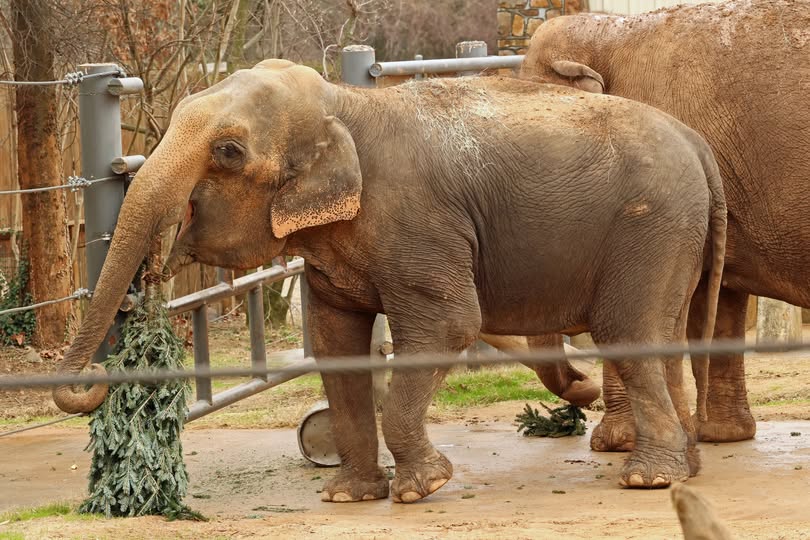
July 2025
Zina, an Asian elephant at the Little Rock Zoo, recently tested positive for tuberculosis (TB). The Zoo’s animal care team identified it through routine testing, and Zina’s prognosis is good. This FAQ page is designed to help answer questions about TB in Elephants and how Zina’s care is being managed. We will update this information as needed as Zina continues treatment.
Overview:
- Zina, the Zoo’s eldest elephant, tested positive for TB during routine, preventative diagnostic testing. She is not showing any symptoms and remains in good health.
- Early detection plays a key role in providing excellent animal wellness and preventive care.
- TB is not uncommon in elephants, especially older individuals imported from Southeast Asia before the 1970s; Zina is 65 years old.
- The Little Rock Zoo has a treatment plan in place and is working with experts to manage Zina’s care.
- Staff are taking all appropriate precautions while providing Zina with the highest level of care.
- There is no risk to guests.
Caring Together
Thank you for your support and for caring about Zina and all the animals who call the Little Rock Zoo home as much as we do. Your compassion means the world to our team. Together, we’re making a lasting difference in the lives of animals, and we’re so grateful to have you on this journey with us.
FAQ: Tuberculosis in Elephants
Testing for TB is part of the Zoo’s routine preventative health protocols for elephants. Zina was diagnosed after a standard trunk wash test detected the presence of TB bacteria. This test is commonly used to monitor for the disease, even when animals aren’t showing symptoms.
A trunk wash is a non-invasive procedure used to collect fluid from an elephant’s trunk to test for TB bacteria. Elephants are trained to voluntarily participate by drawing in a saline solution and then blowing it back out into a collection container. The sample is tested in multiple ways to detect TB bacteria.
This is the first diagnosis of its kind at the Little Rock Zoo. We are following industry-standard treatment practices developed by elephant TB experts and other zoological institutions with experience managing the disease.
TB is an airborne disease spread by bacteria from the lungs. It is most commonly transmitted through prolonged, close contact with an infected individual—whether human or animal.
TB bacteria can live in a body for years, even decades, without causing illness. This is known as a latent infection. It’s not contagious during this phase, but it can become active and develop into TB disease later in life. It’s believed Zina’s infection may have been latent for many years.
It is likely Zina carried a latent TB infection that became active. Many elephants born in Southeast Asia before the 1970s were exposed to TB due to close contact with humans. TB is considered a zoonotic disease, meaning it can be passed between humans and animals.
Most Asian elephants born before 1970 and who traveled from Southeast Asia, like Babe and Zina, have likely been exposed to tuberculosis, so Babe has probably already been exposed to the disease. TB can lie dormant for years, even decades, before an infected animal or human sheds the bacteria or becomes symptomatic. Babe and Zina are both regularly tested for tuberculosis as part of their routine care, which is how Zina was diagnosed. Babe’s tests have remained negative.
Although TB can be transmitted to humans, there is no risk to guests. The distance between visitors and the elephants provides a safe barrier and ensures public safety.
Yes. Elephants can contract TB from humans. This has been documented in other facilities and is one reason staff at the Little Rock Zoo undergo regular TB testing.
Zina has begun a carefully tailored antibiotic treatment plan developed in coordination with our veterinary and animal care staff. Treatment will take several months and includes regular check-ups and blood work to ensure she tolerates the medications well.
Zina may still be visible in her habitat, and she is currently in good spirits. As treatment continues, guests may see staff wearing masks when working near her. These are precautionary measures and part of our standard safety protocols. Babe and Zina are both regularly tested for tuberculosis as part of their routine care which is how Zina was diagnosed. So far, Babe’s test remain negative.
No. Guests are not at risk. The distance between the public and the elephants is more than sufficient to prevent any airborne transmission. Additionally, access to the elephant barn is not part of public access, further ensuring safety.
Yes. Staff working directly with elephants are routinely tested as part of our normal zoonotic disease protocols. Additional testing is being done now as a precaution, even though the risk of transmission is low.
According to the World Health Organization, approximately 25% of the global population has been infected with TB bacteria. It is often treatable with antibiotics and is more common in some parts of the world.
Yes. Asian elephants living near human populations in their native range countries are believed to have been exposed to TB through prolonged human contact. Wild elephants have tested positive for the disease in several parts of the world.
Prevention through regular testing, early detection, and prompt treatment is key. TB is a naturally occurring bacteria found worldwide. Routine monitoring of both animals and staff helps the Zoo stay proactive in protecting health.
Little Rock Zoo
1 Zoo Drive
Little Rock, AR 72205
501-661-7200
Hours of Operation
9:00 AM – 4:00 PM
Last admission 3:30 PM
Zoo grounds close at 4:00 PM




